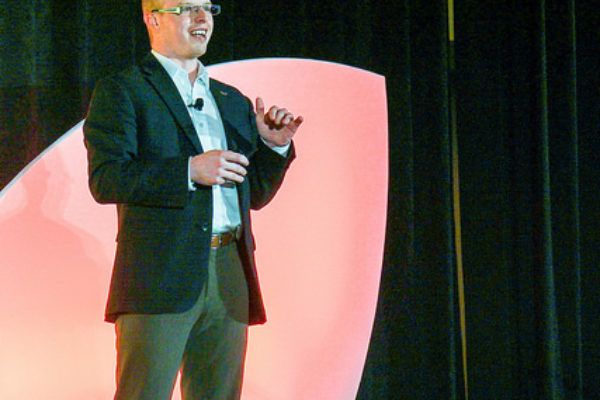JP Rains successfully argued for a 250 percent increase in his digital budget at Laurentian University via conference call from a hotel room in Las Vegas on just a few hours sleep. He shared his story in a 10-minute lightning talk at HighEdWeb 2017.

Between 2012 and 2016, the digital budget the college had to work with remained exactly the same, and it basically covered salaries for his team. Things needed to change if he was going to successfully lead the Digital Strategy Office. He knew he had to get support from three key constituencies: his peers, his campus executive and the president.
Putting the budget In context
An important way to gather that support was to put the budget decision in context. For JP, the context was that no one liked the campus website. Specifically, there were two key issues that resonated with his peers and his campus executive.
- Changes were slow. At one time, tickets to make content changes were taking six weeks from the date of submission to go live online.
- The web presence for academic programs was in dire need of a refresh. Over the last few years, the university made increased investment in academic programs, but not in the web presence of those programs. JP astutely stated, “Programs offer value, and the Web communicates a program’s value. Our increased investment was not communicated on the website.”
Making the ask
That fateful day in Las Vegas, with his president on the phone back in Canada, JP walked through a slide deck that had two sections: “Where Are We Today?” and “Where Could We Be?”
Where are we today?
This wasn’t a fun story to tell, but it was reality. He hammered home the six-week delay for content changes and the out-of-date, poorly designed program pages.
Where we could be
Rather than focus on the cool new digital stuff he could be doing, JP focused on business outcomes that would be valuable to the university. Specifically, how increased digital investment could result in:
- More leads
- More applicants
- More enrollments
Answering questions from leadership
JP was prepared. He prepped for 35 questions. In the end, he only got three.
Q: How can we track the impact of this investment? Specifically, how do we know that digital will generate leads that would not have been generated otherwise?
A: We’ll model the lead growth we’re expecting based on the investment, and then track the Web’s actual impact on the lead outcomes we generate.
Q: Why would your team require two additional staff members? Do these skills or tasks already exist within the organization?
A: We need people that understand content as well as the web, and currently the organization does’t have both of those.
Q: Is this investment more important than mental health?
A: While the Digital Strategy Office can’t influence mental health or student services, we want to make sure we hit enrollment projections and revenue targets. If we don’t hit those, we can’t do the other things.
Wow. That last one would have been tough to handle. But of course, JP handled it like a pro.
The results
JP got his increase. And he left us with this powerful statement:
There are three types of people: people who make things happen, people who watch things happen, and people who wonder what happened. Which one will you be today?

